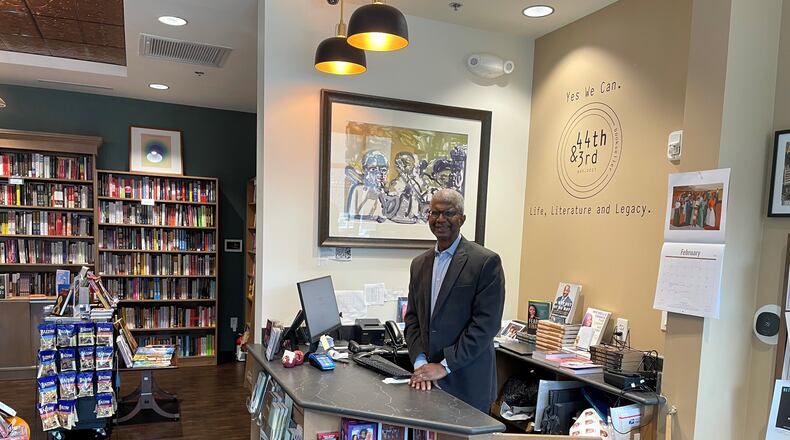When the Barnes & Noble at Edgewood Retail District in Atlanta closed in April 2022, it felt like a big shift in the bookselling industry. Not because one location of the massive bookseller was closing but because it felt as if a certain sense of community was shifting as well.
When my daughter was young, we would go there for story time. Those trips were as much fun for me as they were for her. I met up with other moms and we groused about our lack of sleep and deluge of work.
The children’s section was one of the few places that I would allow her to roam freely as she looked at picture books before graduating to early readers and finally landing at middle grade graphic novels. The bookstore, this bookstore, was the only place where I could barter a new book and a cookie from the cafe for an uninterrupted half-hour to browse the shelves in search of biographies, historical fiction and the occasional beach read.
Now that they have closed, where would we find those moments of connection with books and each other?
The landlord was not renewing the lease, according to the announcement on social media. The post ended with a request for neighbors to suggest a new space in the area where the store might relocate.
For decades, Barnes & Noble had been the biggest, most intimidating bookseller, known for sending indie bookstores packing and scoring cushy discounts from publishers that gave them an unfair advantage in the market.
But this plea to the community to help a 24,500-square-foot store find a new home after being put out by the landlord made Barnes & Noble seem not just touchable but even humble.
It hurt to lose a bookstore, even one in a chain with hundreds of stores in all 50 states, especially at a time when by most measures, bookstores should be thriving.
In 2022, bookstore sales were just under $9 billion, according to a recent article in Publishers Weekly. That figure was 6.2% higher than in 2021.
Physical books are hot again, and despite Amazon’s dominance of the online market, brick-and-mortar bookstores started cropping up everywhere.
A recent working paper by Ryan Raffaelli of Harvard Business School summed up the formula: Successful booksellers focus on community support, curated inventory and promoting their stores as “intellectual centers” for customers with similar interests.
It felt like a good time for me to find a new bookstore with those qualities that wasn’t too far from home, so I visited 44th and 3rd in the West End near the Atlanta University Center.
The family-owned bookstore, named for the 44th president of the United States and the bookstores’ three cornerstones — life, literature, legacy — had closed its Little 5 Points location during the pandemic and reopened in a new mixed-use building not far from Morehouse School of Medicine.
Co-owner Warren Lee said the goal was to create a nurturing environment and serve as a resource for the community of students and residents. They hire students from the nearby universities and ask them to help build engagements that connect with their majors. The shop, which specializes in multicultural books, devotes an entire section to books by, for or about former President Barack Obama and Michelle Obama.
Back on Moreland Avenue, not far from where my local Barnes & Noble met its untimely end, is another indie bookshop. Bookish owner Kendra Gayle Lee (no relation to the bookselling Lees mentioned above) opened the shop in September 2019.
She started out selling used books by text, video or photo during the pandemic and delivered them by hand. “That allowed us to establish a level of loyalty that it takes lots of businesses years to build,” she said.
Bookish’s Lee had just moved to East Atlanta a year before opening the bookstore and recognized people supported spaces that offered a sense of community.
“We are committed that everyone who walks in the store will see themselves in some way represented on the shelves,” Lee said. “People come to Bookish for different reasons. They want a smaller curated selection.”
In a recent interview with The New York Times, Barnes & Noble chief executive James Daunt indicated he was urging the business in a similar direction. He is constantly pushing for stores to have the freedom to display, sort and price books in whatever way they choose, he said.
Barnes & Noble is opening smaller concept stores with a footprint almost half the size of its traditional stores. The first Georgia location of this type is scheduled to open at the Avenue East Cobb, according to reporting from the Atlanta Business Chronicle.
Lee said she doesn’t consider Barnes & Noble to be competition and she wants to see the retailer thrive.
“By and large, more bookstores are always better than less bookstores,” Lee said.
I agree, and as Barnes & Noble embarks on a new path, it is a reminder of how much community (and books) still matters.
Read more on the Real Life blog (www.ajc.com/opinion/real-life-blog/) and find Nedra on Facebook (www.facebook.com/AJCRealLifeColumn) and Twitter (@nrhoneajc) or email her at nedra.rhone@ajc.com.
About the Author
Keep Reading
The Latest
Featured



